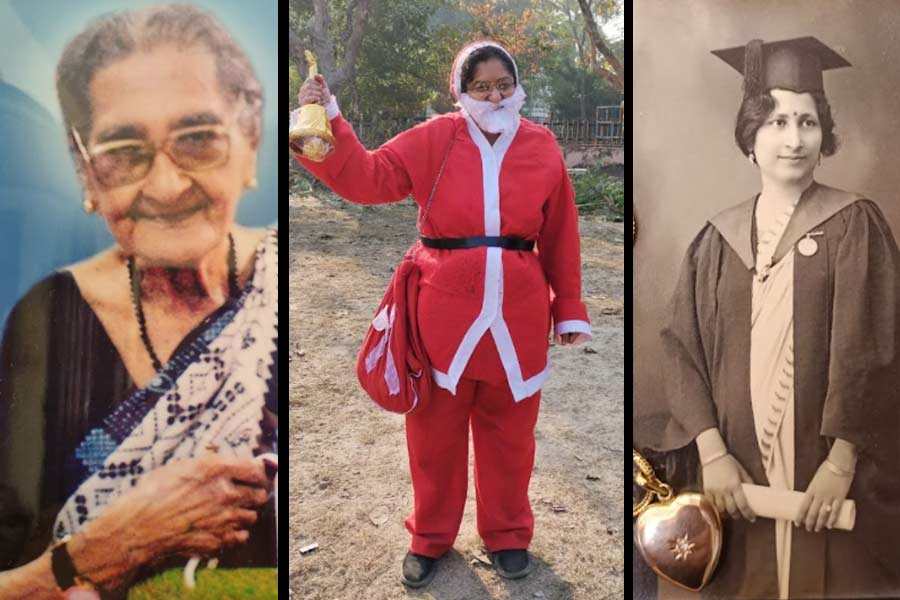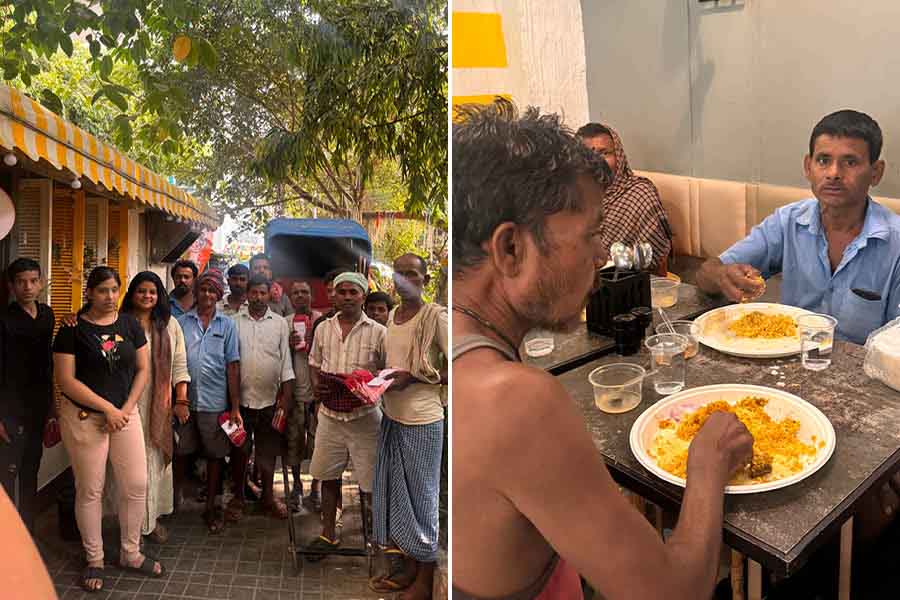As the world celebrates women, My Kolkata turned the mic on the men of our team — a minority in Team MK. We asked the men to talk about a woman in their life they look up to, someone who has influenced their life.
Here's what they had to say…
She came back smiling and stronger, every time
I always wonder how someone who has been through so many battles, always came out smiling? This woman has inspired me more than any other individual possibly could; irrespective of gender there is only one person who I look to for inspiration and that is my mother.
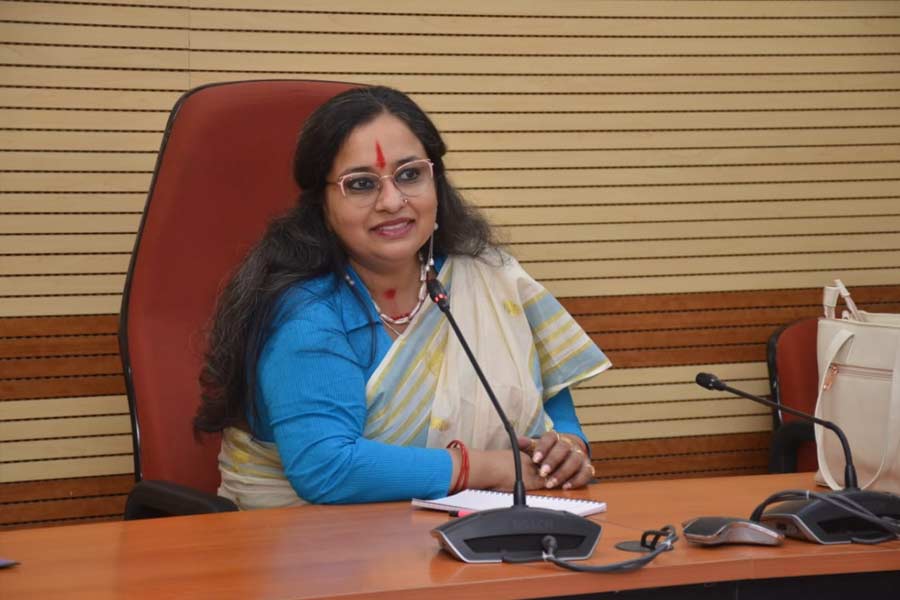
Shatorupa won innumerable battles, and emerged smiling every time
Courtesy Debrup ChaudhuriHalf her life was spent fighting battles for herself and the other half for me. She made the tough choice of sending me away to boarding school to keep a six-year-old child away from the traumatic experience of growing up in a household that was always fighting and of visiting courts for a custody battle. Surviving a horrendous marriage, she chose to walk away from her child to give him the best school environment possible so she could stand on her feet and give him the best life possible.
The backlash from family members and society was cruel. Questions were raised on her choices to send her child away, on her character and yet, today, she is the first person to stand beside someone when they need her. Through it all, she gave me a good life and continues to do so. I have received endless support, never having to make choices about my career or anything else that was not to my liking. In the midst of it all, she built herself up and carved out a successful career as a national spokesperson for a leading political party, and as the Independent Director of NALCO — all without anyone’s help or any favours. She fought against everyone to drop her surname and today stands proud in her identity as Shatorupa.
Today, both she and I are where we are in life because she had the courage to walk away from a situation, and choose to stand on her two feet. What inspires me most about her is that no matter how many times she has been put down, she rises up again with a big smile. I have learnt countless lessons from my mother but the biggest is to always come back stronger and never stay down.
— Debrup Chaudhuri
She was just ‘thamma’, but so much more
From helping refugees during the Bangladesh War by driving them in trucks to rehabilitation camps herself, to receiving medals from two Indian presidents for her contribution and service to the Bharat Scouts and Guides; from supporting various social causes, to being a popular teacher at two of Kolkata’s prominent schools, my grandmother Biva Mukherjee was many things to many people. But what she was first and foremost was humble.
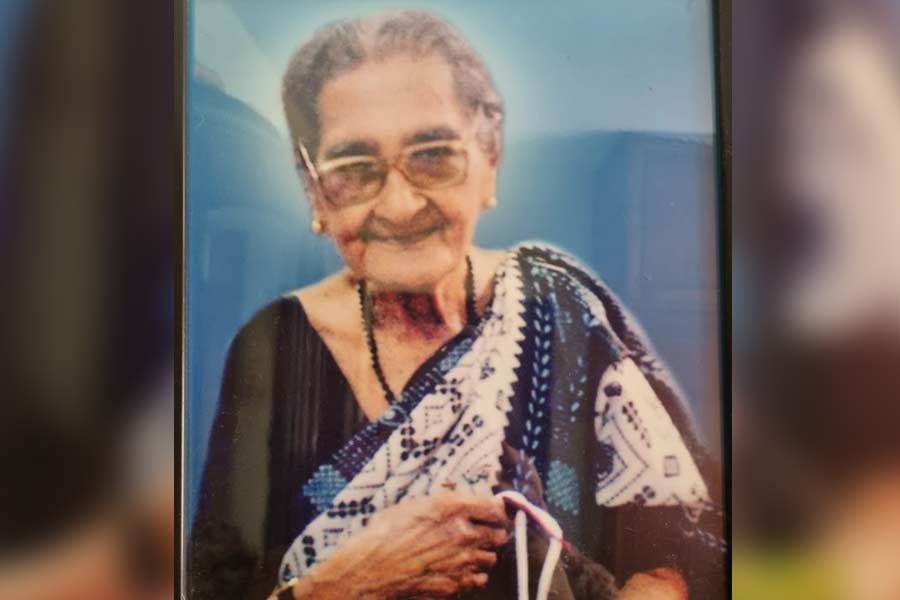
Biva Mukherjee — diminutive in stature but a giant in status
Courtesy Srijoy MukherjeeThe above are not facts that I learnt as a matter of family pride but as a, ‘oh-by-the-way’ throwaway line as I spent one of my many afternoons lying on her lap, hearing her stories. Diminutive in stature, but a giant in status, she was the typical thamma — one that I was lucky to have. Supplying sweets, snacks and pocket money, and saving me from my parents’ occasional ire, she was more umbrella than person — a guard, a shield from the rough elements of life.
Growing up, I did not have the foresight to see her as she truly was. She was just thamma — like a million other thammas — and being nurturing and caring was just part of her DNA. That I was wrong in my lack of foresight was something I learnt the hard way when she developed dementia in her 80s. Thamma, who would remember every single relative’s birthday, forgot what they looked like. The grand dame of my family had a tough golden age, and it was tougher on everyone who loved her. When she finally passed, well into her 90s, she was unrecognisable.
Today, it is not the frailty of her late years that I remember. I remember her affection, her courage and a woman who was strong enough to drive a 1970s-era truck to help those who needed her assistance.
— Srijoy Mukherjee
She chose selflessness, without any resentment or regrets
The thing about cliches is that, more often than not, they are true. Looking up to Shampa, my mother, may sound cliche, but it is also a fact.
My best friend is a woman, a phenomenally versatile person who stays 7,000 miles away, but is the one I speak to the most. Most of the teachers and professors I have admired throughout my academic life have been women. Most of my colleagues, the awesome individuals who give me the finest advice, are also women. But were it not for my mother, I would never have known what it is to appreciate other women and their presence in my life.
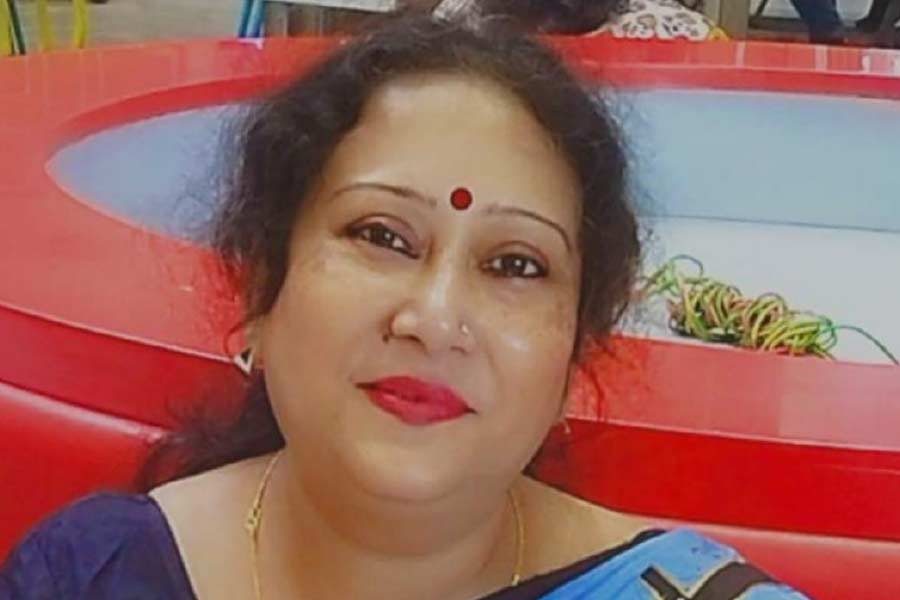
It is because of Shampa, that her son has known what it is to appreciate women and their presence in his life
Courtesy Priyam MarikVery early on, my mother taught me the important, but often overlooked, relationship between discipline and freedom. According to her, freedom only becomes fulfilling when you have the discipline to optimise it. She was never the sort to reprimand me (unless there was a maths exam the next day!) or enforce her choices on me. Looking back, the most valuable thing she did for me was to let me take charge of my life, but without escaping her orbit of guidance.
The way she raised me is not the only reason I look up to her. When she got married at 21, she could have pursued a career in biology or computer science, but chose to take charge of her new family. Her idea was to be the best homemaker she could possibly be, something she still achieves day in and day out. Without this choice of hers, my life and our family may have turned out very differently. A part of me wishes she had prioritised her own career and blazed a trail that made her realise her professional potential, but a greater part of me continues to marvel at how she chose selflessness over selfhood, without any resentment or regrets.
— Priyam Marik
She refused to toe the line, and stole my heart
I was her much-loved chhoto karta (probably because I was named after her late husband Ajit with slight variation), while she was my adorable Didu, my great-grandmother. To the world, she was the much-revered Dr Kalyani Mallik. Notwithstanding her roots in the Jorasanko Tagore family, Didu, the daughter of Hironmoyee Devi and granddaughter of Svarnakumari Devi (elder to brother Rabindranath), refused to toe the line of Tagore women.
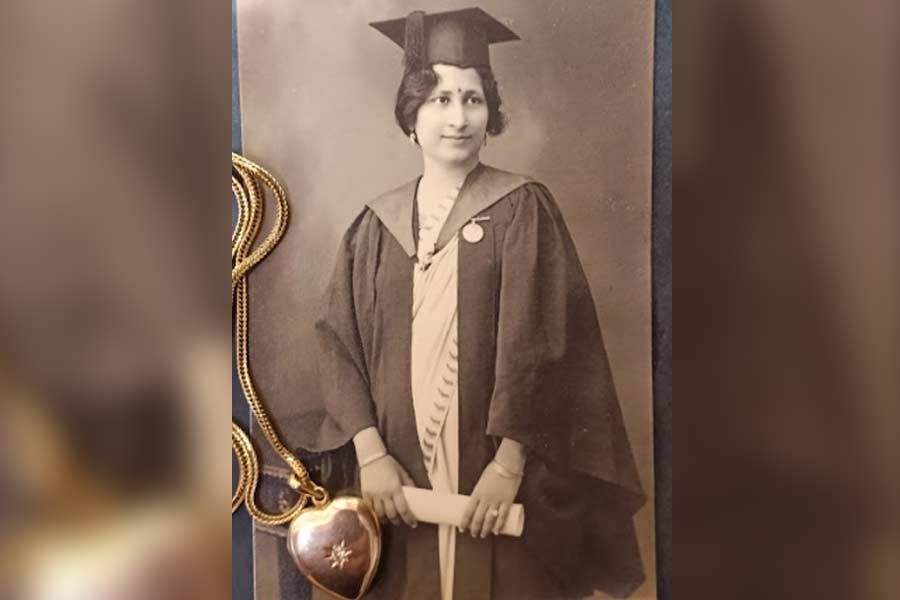
Kalyani Mallik in her MA graduation gown and sporting the Kamala Rani medal, Calcutta 1936, and her gold heart-shaped locket
Courtesy Anujit MitterDidu was born in 1903, and she reflected her grandmother’s strength of character and literary prowess. Raised in Indore, she was given riding lessons at an early age. Married off before her graduation, she kept up with her studies along with sitar and violin lessons. Her sixth child was born a few months before she graduated with honours in 1932. Prabasi published her photograph with her children captioned ‘Creditable Achievement by a mother of six’. Didu stood third — and first among women — in her MA examination as a non-collegiate student of Calcutta University in 1936, winning the Kamala Rani medal. Though her subject was Bengali, she taught Sanskrit at Loreto Entally and Ramakrishna Mission Vidyamandira, Belur. She was honoured with the title ‘Mahamohopadhyaya’ for her research on the lesser-known Naath sect. She also completed her Master of Arts in Bible and Theology degree.
Didu would often be spotted driving her gleaming black Austin 8 on visits to her grandmother’s 3, Sunny Park house, which still stands today. She was a doting grandmother to my father, often making bhapa doi or China grass for him.
Though Didu could be with us physically only for the first 12 years of my life, her profound effect is sure to last a lifetime. My parents would often take me and my brother to visit her at her Garcha Road home. She would pamper us with Parle orange lozenges or jibe gojas, followed by Kissan orange squash. We would eagerly look forward to June 18, her birthday, to relish the homemade ghugni, crispy nimkis and the delicious chocolate cake from Nahoum’s or Kathleen. Our birthdays would mean a quick visit to seek her blessings and paper greetings in the form of a candid note in an envelope containing Rs 101 — prize money for 1980s kids.
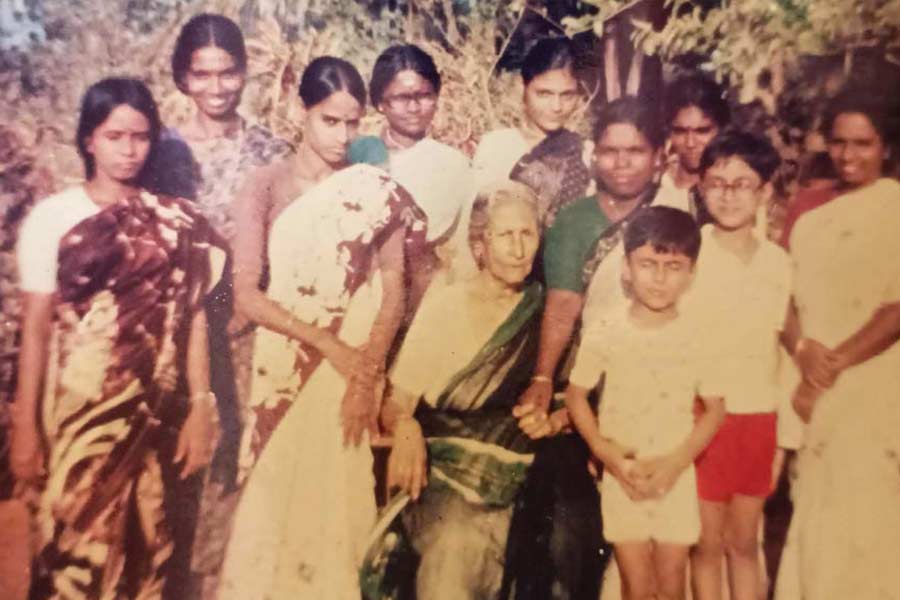
Kalyani Mallik, at 83, with the residents of Sri Kanyakumari Gurukula Ashram, June 1986
Courtesy Anujit MitterThe fondest memories with Didu are from a trip to Kanyakumari — a 37-year-old mother travelling with two children and octogenarian grandmother-in-law for over three nights by sleeper coach from Howrah to Cape Comorin. Didu was 83 and infirm, battling geriatric complications, but her spirit showed no sign of wavering.
The love and respect Didu enjoyed as a scholar and a philanthropist was apparent during the trip. At Kanyakumari, we were witness to her sympathetic and benevolent heart when we were invited to Sri Kanyakumari Gurukula Ashram, a home for orphans, to witness a song-and-dance show followed by a sumptuous lunch on plantain leaves. It is only later that we came to know that Didu had once donated a sum of Rs 3,000 to the organisation — a sum saved up to repair and whitewash her house.
More than three decades have passed since her death but she continues to live on in my heart, err, through a gold heart-shaped locket she lovingly left for me.
— Anujit Mitter
She chooses empathy and doing the right thing, every day
I cannot possibly think of anyone I look up to more than my mother. I’m in awe of her limitless compassion and unending empathy.
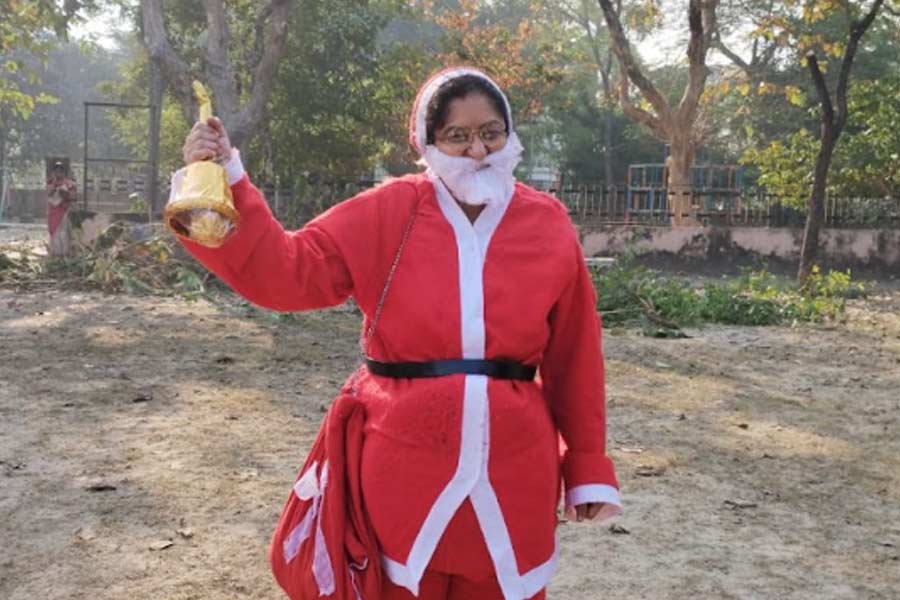
Jagruti dresses up as Santa every year to celebrate Christmas with the kids of her academy
Courtesy Vedant KariaIn an age where people forgo kindness for pragmatism, my mother, Jagruti, manages to consistently do the right thing, even if it comes at a cost to her. She moved to Kolkata, aged 24, after her marriage and today speaks better Bangla than many who have been raised here. She also has a desire to keep learning, and I couldn’t be more proud of the fact that as someone with no background in sport, she began administering a football academy at 40!
Perhaps, more than anything, I respect her patience, for not having kicked me out of the house after 25 years of living together!
— Vedant Karia
To all the women the world over, who make difficult choices, who refuse to stick to convention, who give selflessly, who are brave every day in their own big and small ways — team My Kolkata wishes you all a very Happy Women’s Day.


